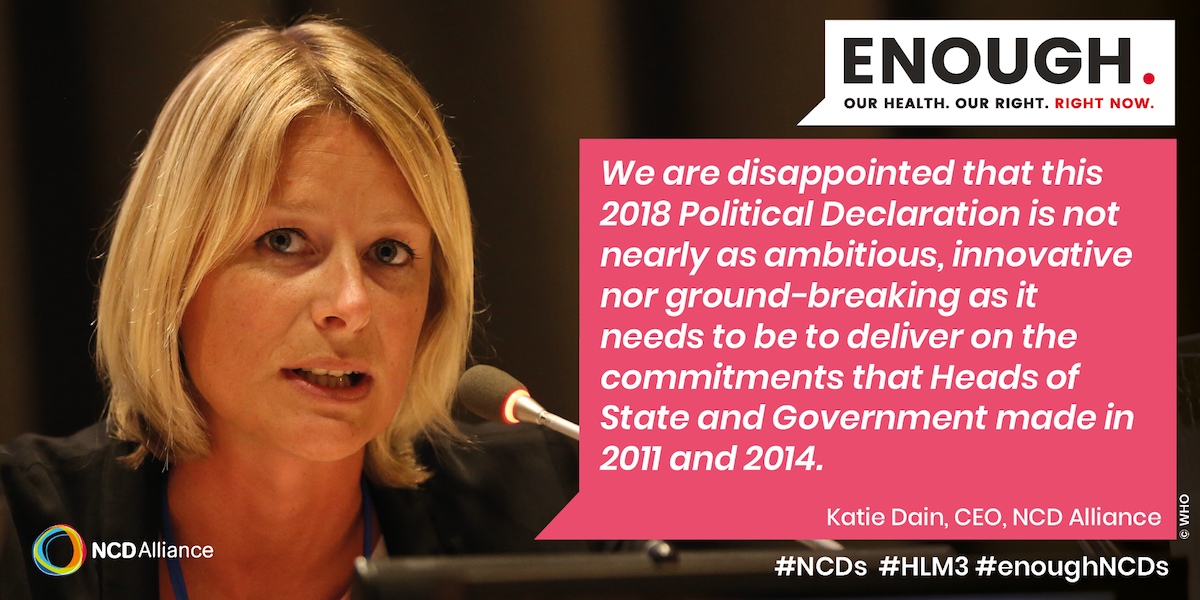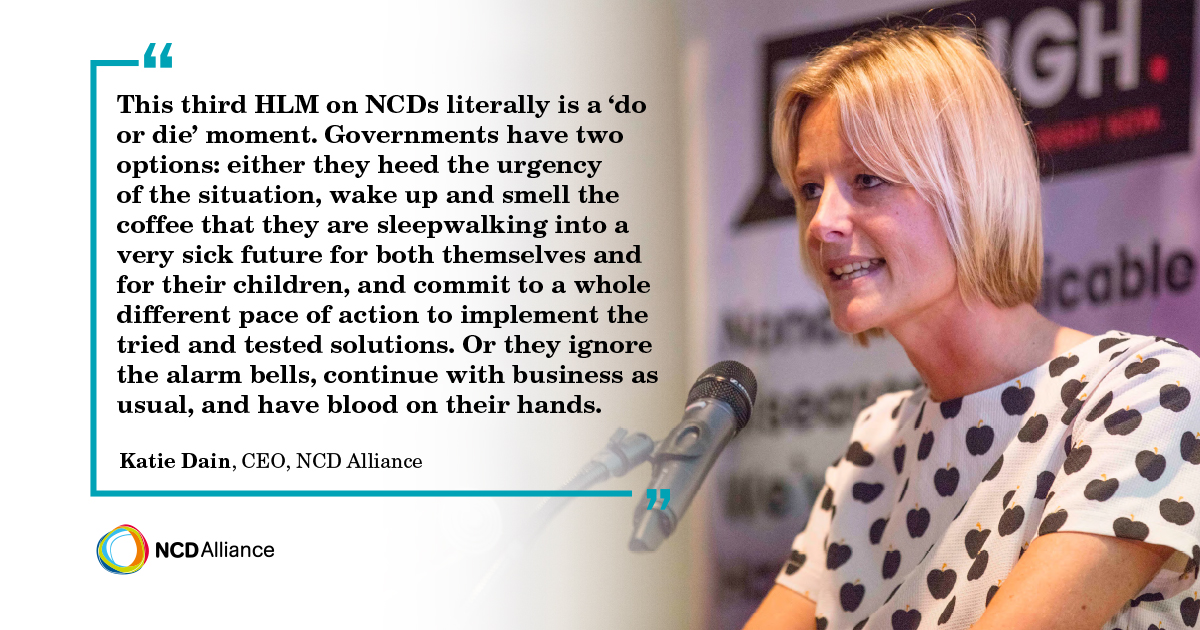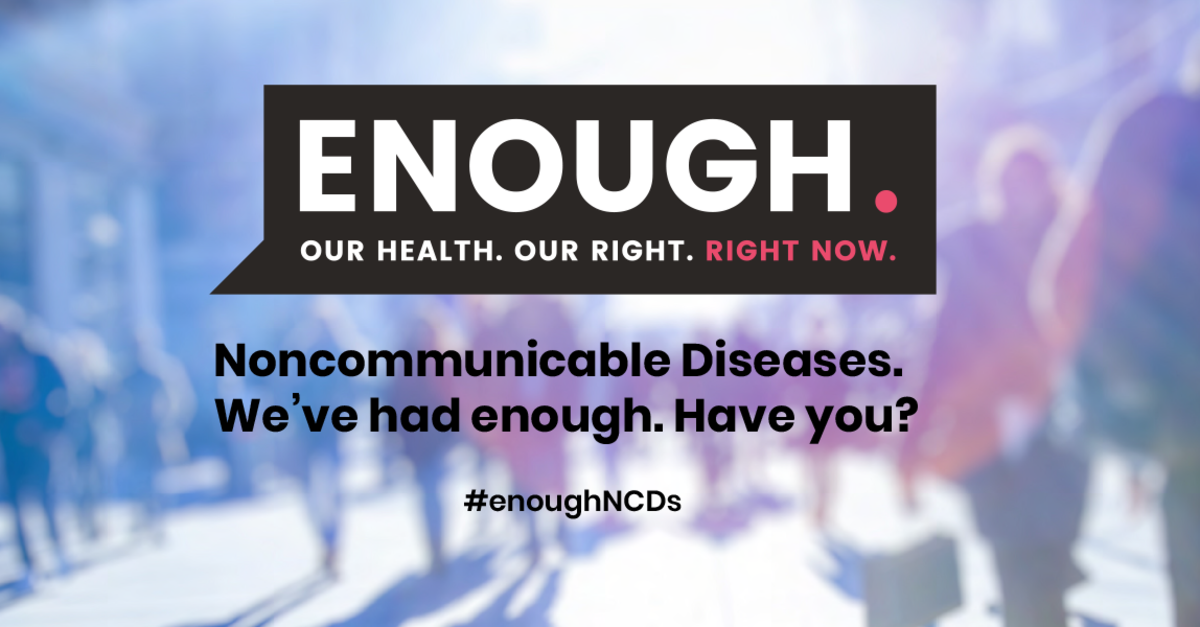
Draft Political Declaration for UN High-Level Meeting on NCDs lacks strength and ambition required to avoid a preventable global health crisis
Media Release
Controversial Omission of Sugar Tax and other critical solutions deplored
Wednesday, 8 August 2018 (New York, USA)–The omission of a sugar tax from the Political Declaration to be adopted at the third United Nations High-Level Meeting on Noncommunicable Diseases (UN HLM on NCDs) being held in New York on September 27 is just one of a number of weaknesses in the final document that fails to commit governments to act and avoid a global health epidemic that could lead to millions of preventable illnesses and deaths.
The 2018 HLM on NCDs will take place at the most precarious of moments: NCDs account for over seven times as many deaths as infectious diseases and the Political Declaration and UN HLM was envisioned as a milestone in the international response.
It is the first time Heads of State and Government will review NCDs within the context of the Sustainable Development Goals and is an opportunity to demonstrate reinvigorated political leadership and commitment to reducing the preventable stigma, suffering and death due to NCDs.
“We are disappointed that this Political Declaration is not nearly as ambitious, innovative nor ground-breaking as it needs to be to deliver on the commitments that Heads of State and Government made in 2011 and 2014,” said Katie Dain, CEO of the NCD Alliance.
“We are particularly concerned at the lack of accountability mechanisms to track, measure and report on progress on the agreed targets for 2025 (link is external) and 2030 (link is external). We also deplore the absence of references to effective WHO Best Buys (link is external) and policy measures like sugar, alcohol and tobacco taxes (STAX), and the extremely long timeline between now and the next proposed HLM, which not only throws the gate wide open for prolonged procrastination and further preventable suffering and loss of life, but also squanders any opportunity for the world’s political leaders to realign the current trajectory of progress on NCD prevention and control if governments remain off track to achieving global targets agreed for 2025.
“Ensuring healthy lives for the world’s people now depends on leaders determined to carry the baton by prioritising optimal health for all people and fully grasping that the HLM must be a transition point from commitment to action which goes well beyond the minimal standards set out in the text of the Political Declaration,” concluded Dain.
All government departments must be accountable
“As a member of Friends of the UN High-Level Meeting on NCDs, I am concerned to see the rapid growth in these epidemics and alarmed that we do not see commensurate responses,” said Rt Hon Helen Clark of The Helen Clark Foundation. “As a former Prime Minister and Minister of Health, I am convinced that real progress will require that all relevant government departments, from agriculture to transport to finance, are assigned responsibilities and targets and made accountable to report directly to the national leadership on this unfolding, yet entirely preventable, crisis.”
“I am pleased to see some progress in some areas over the 2011 Declaration, for example in relation to meaningful engagement of affected communities and language on equity, rights and gender,” said Kent Buse, Chief of Strategic Policy Directions at UNAIDS and a member of Friends of the UN High-Level Meeting on NCDs.
“But I am disappointed that there are no new time bound commitments particularly in relation to the WHO Best Buys measures, and that proactive approaches to regulating the commercial drivers of the epidemic are not explicitly mentioned.”
1 barrier to full agreement
After weeks of negotiations on the Political Declaration, discussions between governments are drawing to a close. The NCD Alliance has been notified by Member State negotiators in New York that as of Friday 27 July, all but one of 34 paragraphs of the outcome document Heads of State and Government will endorse at the HLM in September have been provisionally agreed, subject to agreement on the document as a whole. The remaining paragraph concerns language on The Agreement on Trade-Related Aspects of Intellectual Property Rights (TRIPS) and the Doha Declaration: the same issue that led to the reopening of discussions on the Political Declaration of the UN HLM on Ending Tuberculosis.
NCD civil society had called on governments to adopt an ambitious document that reinvigorated the global NCD response. While the current draft Political Declaration does not include all of civil society’s recommendations, it contains several positive elements. This includes acknowledging and calling for the following:
- Heads of State and Government to commit to provide political leadership for the NCD response, including through policy coherence and coordination;
- Scalingup implementation of commitments made in 2011, 2014 and the 2030 Sustainable Development Agenda;
- Engagement of civil society and people living with and affected by NCDs in the NCD response;
- Recognition thatsocial, economic and environmental determinants, as well as commercial and market factors, affect the risk factors for NCDs;
- Integration of mental health and neurological conditions as core elements of the NCD response;
- Recognition that indoor and outdoor air pollution are significant risk factors for NCDs and drivers of poor health;
- Recognising potential conflicts of interest when partnering with the private sector and calls upon governments to manage them;
- Access to affordable medicines, diagnostics, technologies and palliative care.
However, significant weaknesses exist in the current draft Political Declaration, including:
- No gap analysis of unmet commitments made in the outcome documents of the 2011 and 2014 UN HLMs on NCDs nor pledges of reinvigorated political leadership to meet those commitments;
- Weak language on fiscal measures and no recognition of price and taxation as effective public health policies;
- No commitments to establish independent and transparent accountability mechanisms;
- The inclusion of language on ‘empowering individuals to make healthy choices,’ which fails to recognise that people cannot make healthy choices if the environments in which they live do not provide such choices;
- No recognition of other NCDs, such as renal, oral and eye diseases, as addressed in the Report of the WHO High-level Commission on NCDs;
- Lack of a new call to action on the engagement and responsibilities of the private sector, and insufficient commitment to safeguard against industry interference and incompatible partnerships at national and UN level;
- The text calls for the next UN HLM on NCDs to take place in 2025, whichis the deadline for the nine NCD targets set by WHO in the Global Monitoring Framework for NCDs, and only five years before the deadline for achievement of the Sustainable Development Goals, leaving far too little time to correct trajectory should countries be off-target.
ENDS
Further information
Michael Kessler, Michael Kessler Media
Email: michael.kessler@intoon-media.com
Mob: +34 655 792 699
Skype: mickgpi
Twiter: @mickessler




